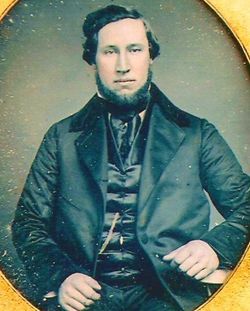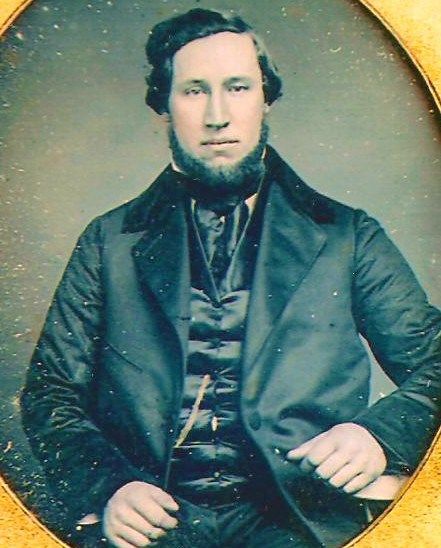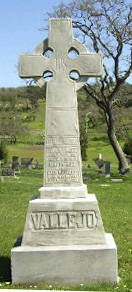Civil War: Major, Field & Staff, Native California Cavalry
José Manuel Salvador del Mundo Vallejo y Lugo was born at Monterey, Alta California, New Spain, January 1, 1813, where he was baptized in the Presidio Chapel (San Carlos) on January 3, 1813 (SC Baptism 02865). Salvador became a Mexican citizen following Mexico's independence from Spain in 1821 and served as a captain under the command of his brother, Colonel Mariano Guadalupe Vallejo, from 1834 until 1847. He was grantee of Rancho Napa in 1838, Rancho San Salvador in 1839, and Rancho Yajome and Rancho Lup-Yomi in 1844. Salvador married María de la Luz Carrillo y López (SD Baptism 04093) at Mission San Francisco Solano on September 8, 1840 (SFS Marriage 00355) and resided on his Rancho Napa, where he planted one of Sonoma Valley's first vineyards. He was taken prisoner by U.S. forces ("Bears") at Sonoma, along with his brother, Colonel Mariano Vallejo, in June 1846. After the war he became a U.S. citizen following the transfer of California's sovereignty in 1848. He lost title to most of his land following California's statehood in 1850. During the Civil War Salvador Vallejo, then 50, was commissioned a major in the California Volunteers at San Francisco on February 9, 1863. Major Vallejo was mustered into Field & Staff, 1st Battalion, Native California Cavalry. Major Vallejo was posted to Arizona where he resigned his commission on February 28, 1865. After leaving military service he returned to his home in Sonoma Valley. He died at the home of his brother Mariano Guadalupe at Sonoma in 1876 and his remains were buried in the Vallejo family plot in Tulocay Cemetery in Napa County (1867 Sonoma Great Register; 1870 U.S. Census; H. Bancroft, History of California, vol. V, pg. 759).
---
LETTERS FROM SONOMA.
CLIMATE - SCENERY - POPULATION - HISTORY
Sonoma, July 18, 1855.
[extracted text]
...there are a number of French and Germans in the [Sonoma] valley ; most of them are agriculturists. There are very few Spaniards*. Though there were a number of families here in '46, they are now nearly all gone...the Spaniards that remain will soon be Americanized. They do not love the American rule, but they know that it must be, and they endeavor to make the best of it. Salvador Vallejo is perhaps the only one who openly speaks of his dislike of the Americans, and he speaks with a refreshing candor, for which even those who dislike him otherwise, give him credit. His name is a fair specimen of Spanish names, Salvador del Mundo (Saviour of the World). He is brother of the General [Mariano Guadalupe Vallejo], and is the subject of a good deal of conversation wherever he is known. He is a powerful man, and the best vaquero to ride the horse and throw the lasso in California, and is withal very brave. It is said that on one occasion he was walking with a couple of Mexicans* through the bushes, near Sonoma, when they suddenly came upon an old grizzly bear with a couple of half grown cubs. Salvador, at that time Captain in Sonoma, told the Mexicans to look out for the cubs, threw his sarape over his left arm, drew his sword, and as the old bear rose upon its hind feet to seize him, he gave her the full length of his sword, and killed her with one thrust. But enough for today. Hasta Luego.
(Daily Alta California [San Francisco], vol. IV, No. 204, Monday, July 25, 1853; 2:2)
* Note the distinction the author makes here between Californios who are wealthy landowners and former officers ("Spaniards") and Californios who were privates or common laborers ("Mexicans"). After their wealth and prestige were lost, many "Spanish" Californios by the 1880's had also become "Mexicans."
---
DEATH OF CAPT. SALVADOR VALLEJO.
Capt. Salvador Vallejo* died in Sonoma City this (Thursday) morning, at a quarter past 4 o'clock, at the residence of his brother, Gen. M. G. Vallejo. He was born in Monterey, in 1814 [sic, 1813]. He came first to Sonoma, as aid to his brother, as early as 1834, and was engaged in the first fights of the Californians with the Indians in this section. He afterwards trapped sea otter along the coast with a Kodiak crew from Fort Ross. Under the arrangement the product of the enterprise was to be divided equally between the California Company, which Vallejo represented, and the Russians, who furnished the skin boats and their crews. He afterwards received the commission of a Captain in the Mexican army, and was engaged for some years in protecting the then frontier settlements of Northern California from the Indians. One of his most notable achievements was the capture of an influential chief, who resided in what is now Yolo county. This chief was brought to the Mission of Sonoma, and the power of his tribe was broken. Capt. Vallejo was a man of very strong prejudices, and never became reconciled to the American occupation of the country. He was at the time of the conquest a large landowner in Napa county; the site of the city of Napa is on his [former] ranch.
(Santa Rosa Daily Democrat, Thursday, Feb. 17, 1878; 3:2)
* Note that his obituary makes no mention of his service during the Civil War as a Major of California Volunteers, but instead uses his Mexican Army rank of Captain.
---
Children:
- María Antonia (1842-1876; m. José Enrique Vallejo y Pacheco [first cousin])
- Manuel Salvador "Abril" (Feb 1844, bap. Nov. 19, 1846 [SFS Baptism 01598]-between 1870-94)
- José Febronio (May 1845, bap. Nov. 19, 1846 [SFS Baptism 01599]-before 1850)
- José Clodomiro (Oct. 4, 1846, bap. Jun. 6, 1847 [SFS Baptism 01643]-before 1850)
- José Ignacio Loyola (Feb. 9, 1849, bap. Oct. 2, 1849 [SFS Baptism 01707]-Feb. 9, 1930, Healdsburg, CA; m. Armandia Soberanes)
- María Anna (mid 1850-[?Dec. 10, 1932?], Los Angeles; m. Kincaid of San Diego)
- María Anna Teclacilla Ynez (Sep. 3, 1851-Dec. 6, 1915; m. William Frisby in 1869)
- María Zarella (Mar. 3, 1853-Jun. 27, 1925; m. John Gedge in 1875)
- Vicencio or Vicente (1855-before 1894)
- Platón (1860-Aug. 2, 1933, Los Angeles; m. Isora Katherine Cullen [Aug. 18, 1874, IL-Oct. 26, 1955, L.A.] on Apr. 22, 1900, Los Angeles)
Biography by Steve
Civil War: Major, Field & Staff, Native California Cavalry
José Manuel Salvador del Mundo Vallejo y Lugo was born at Monterey, Alta California, New Spain, January 1, 1813, where he was baptized in the Presidio Chapel (San Carlos) on January 3, 1813 (SC Baptism 02865). Salvador became a Mexican citizen following Mexico's independence from Spain in 1821 and served as a captain under the command of his brother, Colonel Mariano Guadalupe Vallejo, from 1834 until 1847. He was grantee of Rancho Napa in 1838, Rancho San Salvador in 1839, and Rancho Yajome and Rancho Lup-Yomi in 1844. Salvador married María de la Luz Carrillo y López (SD Baptism 04093) at Mission San Francisco Solano on September 8, 1840 (SFS Marriage 00355) and resided on his Rancho Napa, where he planted one of Sonoma Valley's first vineyards. He was taken prisoner by U.S. forces ("Bears") at Sonoma, along with his brother, Colonel Mariano Vallejo, in June 1846. After the war he became a U.S. citizen following the transfer of California's sovereignty in 1848. He lost title to most of his land following California's statehood in 1850. During the Civil War Salvador Vallejo, then 50, was commissioned a major in the California Volunteers at San Francisco on February 9, 1863. Major Vallejo was mustered into Field & Staff, 1st Battalion, Native California Cavalry. Major Vallejo was posted to Arizona where he resigned his commission on February 28, 1865. After leaving military service he returned to his home in Sonoma Valley. He died at the home of his brother Mariano Guadalupe at Sonoma in 1876 and his remains were buried in the Vallejo family plot in Tulocay Cemetery in Napa County (1867 Sonoma Great Register; 1870 U.S. Census; H. Bancroft, History of California, vol. V, pg. 759).
---
LETTERS FROM SONOMA.
CLIMATE - SCENERY - POPULATION - HISTORY
Sonoma, July 18, 1855.
[extracted text]
...there are a number of French and Germans in the [Sonoma] valley ; most of them are agriculturists. There are very few Spaniards*. Though there were a number of families here in '46, they are now nearly all gone...the Spaniards that remain will soon be Americanized. They do not love the American rule, but they know that it must be, and they endeavor to make the best of it. Salvador Vallejo is perhaps the only one who openly speaks of his dislike of the Americans, and he speaks with a refreshing candor, for which even those who dislike him otherwise, give him credit. His name is a fair specimen of Spanish names, Salvador del Mundo (Saviour of the World). He is brother of the General [Mariano Guadalupe Vallejo], and is the subject of a good deal of conversation wherever he is known. He is a powerful man, and the best vaquero to ride the horse and throw the lasso in California, and is withal very brave. It is said that on one occasion he was walking with a couple of Mexicans* through the bushes, near Sonoma, when they suddenly came upon an old grizzly bear with a couple of half grown cubs. Salvador, at that time Captain in Sonoma, told the Mexicans to look out for the cubs, threw his sarape over his left arm, drew his sword, and as the old bear rose upon its hind feet to seize him, he gave her the full length of his sword, and killed her with one thrust. But enough for today. Hasta Luego.
(Daily Alta California [San Francisco], vol. IV, No. 204, Monday, July 25, 1853; 2:2)
* Note the distinction the author makes here between Californios who are wealthy landowners and former officers ("Spaniards") and Californios who were privates or common laborers ("Mexicans"). After their wealth and prestige were lost, many "Spanish" Californios by the 1880's had also become "Mexicans."
---
DEATH OF CAPT. SALVADOR VALLEJO.
Capt. Salvador Vallejo* died in Sonoma City this (Thursday) morning, at a quarter past 4 o'clock, at the residence of his brother, Gen. M. G. Vallejo. He was born in Monterey, in 1814 [sic, 1813]. He came first to Sonoma, as aid to his brother, as early as 1834, and was engaged in the first fights of the Californians with the Indians in this section. He afterwards trapped sea otter along the coast with a Kodiak crew from Fort Ross. Under the arrangement the product of the enterprise was to be divided equally between the California Company, which Vallejo represented, and the Russians, who furnished the skin boats and their crews. He afterwards received the commission of a Captain in the Mexican army, and was engaged for some years in protecting the then frontier settlements of Northern California from the Indians. One of his most notable achievements was the capture of an influential chief, who resided in what is now Yolo county. This chief was brought to the Mission of Sonoma, and the power of his tribe was broken. Capt. Vallejo was a man of very strong prejudices, and never became reconciled to the American occupation of the country. He was at the time of the conquest a large landowner in Napa county; the site of the city of Napa is on his [former] ranch.
(Santa Rosa Daily Democrat, Thursday, Feb. 17, 1878; 3:2)
* Note that his obituary makes no mention of his service during the Civil War as a Major of California Volunteers, but instead uses his Mexican Army rank of Captain.
---
Children:
- María Antonia (1842-1876; m. José Enrique Vallejo y Pacheco [first cousin])
- Manuel Salvador "Abril" (Feb 1844, bap. Nov. 19, 1846 [SFS Baptism 01598]-between 1870-94)
- José Febronio (May 1845, bap. Nov. 19, 1846 [SFS Baptism 01599]-before 1850)
- José Clodomiro (Oct. 4, 1846, bap. Jun. 6, 1847 [SFS Baptism 01643]-before 1850)
- José Ignacio Loyola (Feb. 9, 1849, bap. Oct. 2, 1849 [SFS Baptism 01707]-Feb. 9, 1930, Healdsburg, CA; m. Armandia Soberanes)
- María Anna (mid 1850-[?Dec. 10, 1932?], Los Angeles; m. Kincaid of San Diego)
- María Anna Teclacilla Ynez (Sep. 3, 1851-Dec. 6, 1915; m. William Frisby in 1869)
- María Zarella (Mar. 3, 1853-Jun. 27, 1925; m. John Gedge in 1875)
- Vicencio or Vicente (1855-before 1894)
- Platón (1860-Aug. 2, 1933, Los Angeles; m. Isora Katherine Cullen [Aug. 18, 1874, IL-Oct. 26, 1955, L.A.] on Apr. 22, 1900, Los Angeles)
Biography by Steve
Family Members
-
Maria Isidora Vallejo Soberanes
1792–1830
-
Josefa Maria Vallejo Madariaga
1794–1836
-
Jose Ygnacio Vallejo
1796–1826
-
![]()
Jose de Jesus Vallejo
1798–1882
-
Juana Maria Gertrudes Vallejo
1800–1820
-
Maria Magdalena Vallejo del Valle
1803–1825
-
![]()
GEN Mariano Guadalupe Vallejo
1808–1890
-
![]()
Maria Geronima de la Encarnacion Vallejo Cooper
1809–1902
-
![]()
Maria Paula Rosalia Vallejo Leese
1811–1889
-
![]()
Maria de Jesus Vallejo Lugo Fortoul
1814–1876
-
![]()
Antonio Juan Bautista Vallejo
1816–1857













